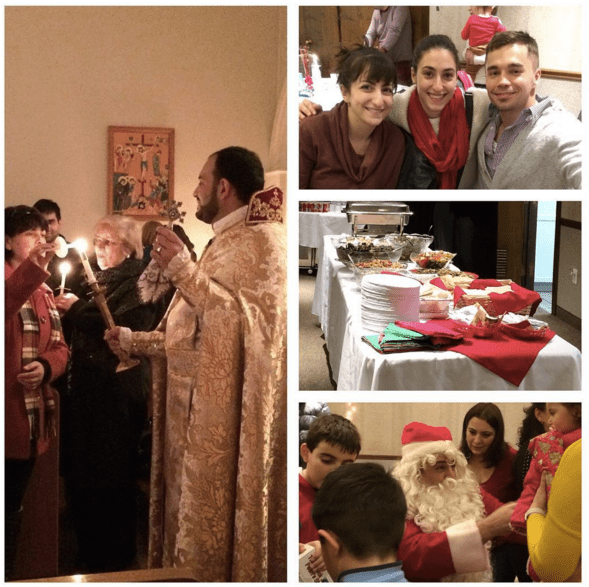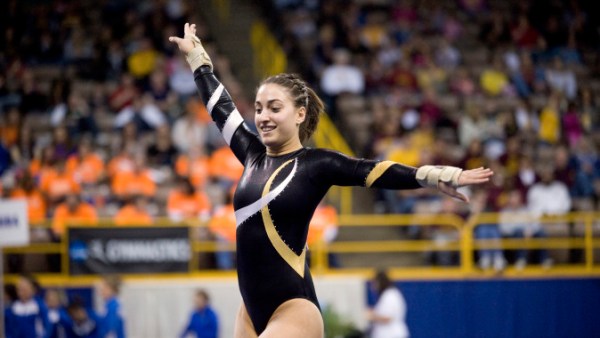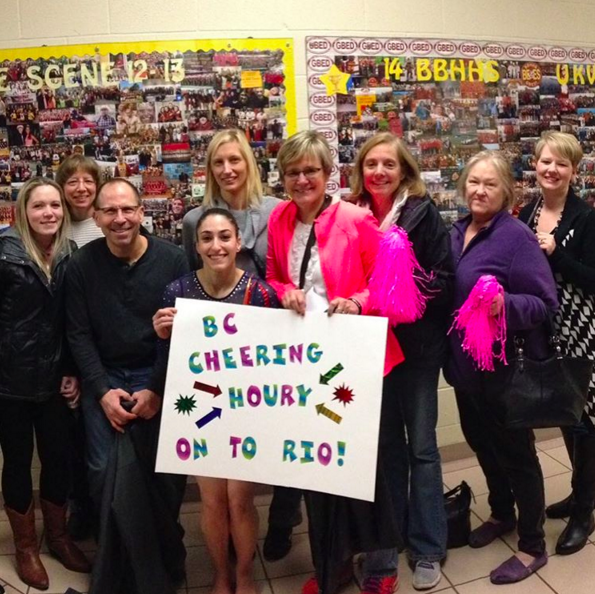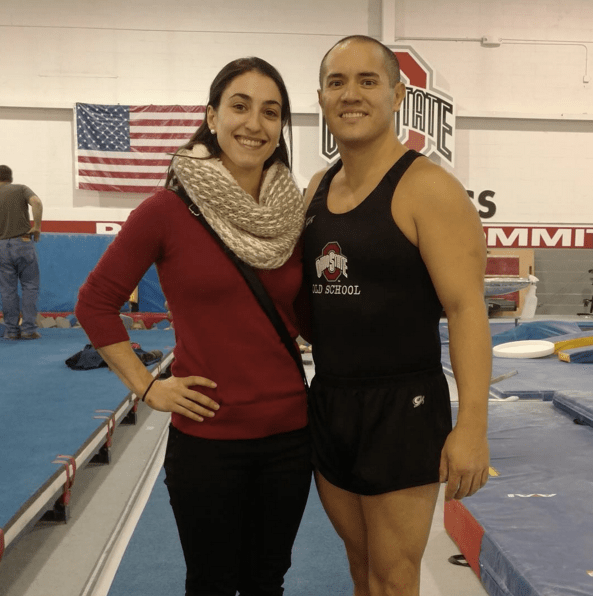
When Houry Gebeshian finished her collegiate career at the NCAA Championships in 2011, she knew it wasn’t going to be the end of her gymnastics career.
The 26-year-old who competed for the University of Iowa had big dreams of representing Armenia at the Olympic Games. When injuries made it impossible her first time around, Gebeshian came back more determined than ever last year, earning a coveted individual test event spot with the highest elite all-around score of her career.
Now the Olympics are more than a dream. They are quickly becoming Gebeshian’s reality, and she lets no obstacles stand in her way, coaching herself at the elite level while juggling a full-time career as a physician’s assistant and enjoying life with her longtime boyfriend (fiancé as of last week!) and her stepson. Her journey to the Games hasn’t been a typical or easy one, but her story is an inspiration to anyone who has ever had a dream.
We grabbed a moment of Houry’s precious free time to talk about her preparation for Rio, how she balances everything going on, and her awesome story that took her from active child to Olympic hopeful.
How did you get started in gymnastics?
I think every little gymnast has a very similar story about being an active child. My mother loves to tell the story of how I used to somehow wiggle myself out of my car seat. She knew I needed to get involved in something so she took me to a local YMCA. The teachers there told my mom that I needed to go to an actual gymnastics gym and lucky for us Massachusetts Gymnastics Center (my home gym) was coincidentally right around the corner from our house!
You had a pretty traditional route from a successful J.O. career into the NCAA path. In those years, did you ever think about elite or the Olympics?
My mother and my athletic trainer, Ken Johnson, encouraged me to pursue competing internationally for the Republic of Armenia when I was in high school. I never took their suggestions seriously, and I really wish I would have. I didn’t think that I was good enough to go the elite route. It was also around that time that I learned that competing for the NCAA was a realistic option. I chose to compete in college and pretty much forgot about the idea of competing internationally until many years later.
When did you decide to try elite and how did it come about? Armenia doesn’t necessarily have a big gymnastics program up and running, so what was the process like in terms of working with their Olympic Committee? Did you go back to your club gym to train?
I took a very untraditional path into elite gymnastics. Most girls will try elite in their younger years and then pursue collegiate gymnastics. Very few will go back to elite gymnastics after college. I made it to level 10 by the end of high school. I then competed as an all-around gymnast for the University of Iowa. Following my collegiate career, I thought I would give elite gymnastics a try. So at age 22, I had my debut to elite gymnastics at the World Championships.
You are right; Armenia doesn’t have a big gymnastics program. Actually, their women’s program is non-existent. I was sought out to help change this. One of my dad’s friends worked for the Armenian Olympic Committee and said that they were looking for more female representation in the Olympics. He suggested that I try, so I did. I had a little help getting my dual citizenship and it took off from there. The process has been a challenging one. I work through the men’s program based out of Armenia and trust that they will register me for the meets I need to go to. I had to prove to them that I would be an asset to their team. They support my dream by providing me with the opportunity, but I receive no financial assistance from Armenia. The first time I competed for them, I trained at the University of Iowa. When making my come back, I thought about going back home to train, but found a great gym in Cleveland, Ohio. Mr. and Mrs. Ganim at Gymnastics World were the most welcoming family who provided me with the facility that I needed.
Growing up in Massachusetts, did you have a lot of ties to your Armenian heritage?
I grew up in an Armenian household. We spoke the language, ate the food, followed the customs, and went to the local Armenian church, but that got lost somewhere along the way. I spent 20+ hours in the gym every week for about 20 years. On top of that I worked another 20 hours a week to pay for my gymnastics training, all while trying to live a normal high school life. Being Armenian wasn’t really on the top of my priority list. I am so thankful that the opportunity to compete for the Republic of Armenia came about, as it has brought me back to my Armenian heritage and has given me a sense of community and national purpose.

Houry celebrating an Armenian Christmas Eve
It seemed like a really quick turnaround between finishing up your NCAA career in April and then competing at worlds six months later. Did you have any expectations for yourself at worlds that year?
I knew at the start of my senior year of college that my gymnastics career was not going to be over at the end of the NCAA season. I already had it in my mind and had the right things in place to be competing at the 2011 World Championships. I had big expectations for myself at Worlds. My goal was to qualify to the 2012 Olympic Test Event and then qualify onto the 2012 Olympic Games. It wasn’t an unrealistic goal, but I didn’t truly think that it was attainable. Unfortunately, injury set me off course. I pushed myself too hard and my body couldn’t handle it. I developed a stress fracture in my heel about a month before the competition. This restricted my training and forced me to significantly water down my routines at Worlds. I didn’t compete up to the level that I could have and didn’t meet my goals or expectations.
What was the experience of your first world championships like? How did you feel about your performance there? What about just the general feel of being there?
The 2011 World Championships was my debut to elite gymnastics. I was a little bit starstruck when I first got there. I was going to be competing alongside the best gymnasts in the world! I was a little overwhelmed as well, as I had never competed at such a large event. I had to remind myself that it is still the same equipment, same routines, and competition. I was also embarrassed because I knew that I wouldn’t be competing up to the level I was capable of. I didn’t want to let myself down, my coach down, and most importantly, my team down. Unfortunately, I did. I was proud of myself for making it through the competition but I was devastated at my poor performance. Although, it was a good experience. I am fortunate to have had the opportunity, and I am glad I did it.
Coming from more of a team environment in the NCAA, was it a shock going into the more solitary elite world? You kind of had an intro to that, qualifying to NCAA Championships as an individual in your senior year…did you take anything from that experience with you to Tokyo?
It is definitely different competing in the elite world compared to the NCAA world. In college, I always had my teammates around. Once I stepped into elite gymnastics, I was alone. That was scary and lonely, but I knew it was something I had to do. NCAAs were a very good stepping stone for me. It was the first competition where I competed up on a podium, was a lone competitor, and was truly competing for myself again. The biggest thing for me was competing on a podium. The equipment felt just a little more bouncy, the judges were kind of hidden below me, and I really felt like I was the center of attention when I was up. It was nerve-wracking, but I am glad to have had that experience at least once before Worlds. I got a little taste of how solitary elite gymnastics was in 2011, but that was nothing compared to what it is like now. I am the only one in the gym every day when I go in. I train alone and I coach myself. It is a lonely journey but one that is worth it.

Houry competing for the University of Iowa at NCAA Championships in 2011
Lots went on in your life during your hiatus from the sport…can you tell us about getting your masters and going on to your current job?
In 2011, my back-up plan, if I didn’t qualify to the Olympics, was to go to graduate school and study to become a physician assistant. I applied for PA school in the summer of 2011 and started interviewing that winter. Lucky for me, I was accepted into the Wake Forest University School of Medicine’s Physician Assistant program. I started in June 2012 and graduated in May 2014. I really thought that healthcare would fill the void that gymnastics had left. I hoped that maybe a new passion would replace the old. But, it didn’t. During my first clinical rotation I met my boyfriend at the time, now fiancé, Duane. He was a former college football player, who was finishing up his surgical residency training. While talking to him and reminiscing about our athletic careers, he noticed that something was still missing in my life. That was obviously gymnastics and he encouraged me to try again. He really believed that it wasn’t too late for me. From that point on, I knew that I needed to try and I wouldn’t be happy if I didn’t. Following PA school, I moved to Cleveland, found a wonderful gym to train in and started training. Now the only problem was finding a job so that I could pay for all of the expenses associated with training for the Olympics.
What is it that you do for work? Do your coworkers know about your ‘second life’ and are they supportive of your goals?
I am a physician assistant who works for the Cleveland Clinic in the department of surgery on the labor and delivery floor. It’s a birthday every day at my job! I was incredibly fortunate to find the job that I currently have. It would have been easy for me to coach gymnastics to help pay for my training, but I wanted to start my career as a physician assistant. It was like this job was meant for me. It opened up at exactly the right time. I was offered the last interview spot and was lucky to have impressed my boss enough to hire me the following week! Although, throughout the interview I made it very clear that my number one priority was to train for the Olympics. He was incredibly supportive of this goal and has been ever since. The other physician assistants in my group are the most phenomenal people. They selflessly pick up shifts for me when I have to travel for gymnastics competitions or for other life happenings. At first, I didn’t tell anyone at the hospital about my “second life” as an elite athlete. It wasn’t until after the European Championships that I finally started to tell people. I felt that I was legitimate at that point. I didn’t want to tell people that I was training for the Olympics and have them not take me seriously. But slowly, my body started to change, I was missing weeks of work at a time, and people started asking questions. Since finding out, everyone has been extremely supportive. Now, I am excited to share my story with as many people as I can.

With most elite gymnasts still 18 and under living with their parents, it’s pretty interesting to see adult gymnasts in the sport with careers and relationships. What is that balance like for you? How do you manage things like lengthy trips for competitions? Do you find it similar to balancing school with gym or is it totally different?
Life is a balance and nothing is unmanageable. If there is a will, there is a way. I am passionate about everything in my life. I am a physician assistant, gymnast, coach, Armenian, and stepmom. I wouldn’t change anything if I could. My life is pretty structured and I have very little free time, but I actually prefer it that way. I think the balance now is different than the balance of school with gym, as this is finally the life I chose to live and I am happily embracing it. It is a tough balance, especially when people do not understand the sacrifices I make or the time restrictions I have. For example, instead of lounging at home and watching a movie on a Saturday night, I am reading up on how to sneak veggies into a child’s diet or taking an online course about social marketing. Or after coming home from practice, most other gymnasts rest their body. I head straight to the hospital for a full night of work in the operating room.
With your job and time training for the Olympics, what is a typical day like for you?
I work a 24 hour shift on Sunday and a 16 hour night shift on Wednesday, which adds up to a 40 hour full-time work week. So typically, on the nights that I work, I get off at 7 am. I will take a nap from 7:30 am – 10:30 am and then head straight to the gym. I will then train for the next 4-5 hours from 11:30 am – 4:30 pm. I’ll get home around 5-5:30 pm and start making dinner. My favorite part of the day is when my fiancé and I sit down for dinner and catch up on each other’s days. After dinner, I usually work on the computer doing promotional things, work out plans, meal ideas, writing e-mails, catching up on bills, or other general life tasks. Now, as a reward I’ll probably work in wedding planning! I try and get to bed by 10:30 pm. Lucky for me, I have the next couple of days to recover before working again so I allow myself to sleep in a bit before doing it all over again!

Houry hard at work after a long night of delivering babies
Between the 2011 World Championships and European Championships last year, you brought your all-around score up by over five points, which is super impressive. During the break, did you train straight through with the goal of coming back for the 2016 Games? What did you work on most to boost your start values, execution, and confidence at the elite level?
After my dream of competing at the 2012 Olympic Games was shattered, I left the sports thinking I was never going to return. During the middle of PA school, I decided to make my comeback on July 18, 2013 but I wasn’t able to step foot in a gym to legitimately start training until July 7, 2014. It was a challenge to come back having taken a 3 year haitus from the sport. I was out of shape and wasn’t sure where to start. But I went into the gym every day with the new goal of the 2016 Olympic Games in mind. My hope was to get all the skills back that I originally had. By the 2015 European Championships, I had everything back except for my double back dismount off of the beam. I was able to get that last skill back and shortly thereafter, I did it well at the 2015 World Championships. I may not have the highest difficulty routines but I have all of my requirements. The routines I am competing now are the same routines that I was planning on competing in 2011. My score was so low in 2011 mostly because I had to water down my routines due to injury. I have significantly matured during my time away from the sport. My confidence has improved, I am in the best physical, mental and emotional shape of my life, and I am truly happy. The biggest thing that has changed is that I am 100% focused on the goal at hand. Yes, I have a million things to juggle in my life, but they aren’t distractions. They motivate me to stay on task and be the best person I can be in all assets of my life.
Of the 40 individual qualification spots at the test event, you got the 27th, and 35 gymnasts from individual nations will move forward from the test event to the Olympic Games. What are you working on most to ensure you get one of those spots? Does it come down to adding skills or focusing on what you have?
At this point I am mostly focusing on what I have. I am my own coach so my emphasis is to do the skills I know and execute them well. I would love to learn new skills, but unfortunately I don’t have a coach to work with routinely, and teaching yourself a new skill is near impossible. Although, I am working on upgrading my vault to a yurchenko double full and trying to learn a new second vault, a tsuk full with the help of the men’s team head coach, Greg Skupski.

Houry at world championships in 2011 and 2015
Mentally, what is the experience like looking at the test event in the near future? Are there things you do to stay sane so you’re not constantly thinking about it or feeling that pressure?
I just take it day by day. There is no need to stress about things that I cannot control. I have my life scheduled out for the next 3 months. If I just stick to the plan, I will feel prepared and ready to go on competition day. I also have a lot of other things to take my mind off of gymnastics when I am not in the gym. I focus on executing the best possible patient care when I am at work, I try and make it to as many local Armenian functions as I can, and I really enjoy the weekends I get to spend with my stepson.
How has the experience of being an NCAA gymnast helped you at the elite level?
Being a collegiate athlete taught me how to compete. I was always motivated, disciplined, and passionate about the sport, but I never had that drive to compete or perform. Collegiate gymnastics forces you to step out of your shell. It also teaches you to pay attention to the details. Every step, frown, or short cast handstand is the difference between winning and losing. I have taken these lessons to the elite level. I am now, more than ever, depending on my execution and presentation to make it through to the next round.
Is there anyone in the sport at any level who you really look up to or admire? Have any other gymnasts given you advice through this journey?
When I was a young gymnast I looked up to one of the older girls at my home gym, Nicole Langevin. She was always so poised and elegant which is fitting because she now has her own choreography company, Precision Choreography. We were able to reconnect after all these years for her to personally choreograph my current beam and floor routine as well as custom cut my floor music. She did a phenomenal job.
.
Houry on floor at the 2015 World Championships
Another idol of mine was, and still is, Dominique Moceanu. As a young gymnast, she was probably the most inspiring role model I had. Never in my life did I think that I would meet her, but that opportunity arose at the 2011 World Championships and it changed my life. As I walked out of the arena, she was waiting there with her husband, Dr. Michael Canales, to interview me! By coincidence, we were on the same flight back to the United States. I built up enough courage to chat with them before getting on board and learned that Dr. Canales worked in Cleveland as a podiatric surgeon. I told him that I was thinking about going into PA school and he left me with an open invitation to do a clinic rotation at his practice. Well, 2 years later, I took him up on the offer! On that rotation, I met Duane, and now I am here in Cleveland living and training. Recently Dominique has been a very influential mentor in the process of how to promote myself and represent myself as a professional sports figure.

Houry with Dr. Michael Canales
What advice do you have for others who may want to go that similar strange but awesome route from NCAA to elite?
It is never too late to deliver a dream. Do not lose focus on the love of the sport. My passion for gymnastics is what has kept me going and as long as you keep enjoying what you do every day, it will take you as far as you want to go.
Learn more about Houry Gebeshian and follow her incredible journey through her Facebook, YouTube, Instagram, and Twitter.
Article by Lauren Hopkins
Photos thanks to Houry Gebeshian and the University of Iowa



When is through test event?
LikeLike
The test event….not through…..stupid autocorrect/fat fingers
LikeLike
Mid-April, I think.
LikeLike
Speaking as an U.S. born child of immigrants from a third-world country: I feel really conflicted about U.S.-born Americans – with every advantage that being born in this country permits them – getting to compete at high-profile international competitions (by reason of an accident of birth that qualifies them to represent a country that they have never lived in) without achieving at a level that would qualify them to represent the U.S. team. This is particularly true when other U.S.-born Americans are:
– Literally vilified for competing for a country they have never lived in, because they don’t benefit from the same accident of birth that privileges the former U.S.-born Americans; or, at minimum, in every case…
– Disqualified from international competition by virtue of a two-per-country rule that privileges all of those deemed to be “from” other countries, even if they are U.S.-born Americans.
Lauren, I sense that you don’t share my reservations on this front, so I’d be interested in your thoughts on why my reasoning is incorrect. For my part, I’d like to see a residency requirement, requiring athletes to live in the country they purport to represent for a set number of years before they are eligible (not necessarily the years immediately before they compete internationally, because I understand that a number of athletes relocate to wealthier countries to have access to better coaching and training facilities, which I can understand.) As I stated at the outset, I am an American child of immigrants from an impoverished country, but I think it would be tremendously disingenuous for me to purport to represent my parents’ country, in which I have never lived (or even visited)…even if I share some cultural elements by virtue of my upbringing. The woman profiled here is an American training in America who candidly admits that “[b]eing Armenian wasn’t really on the top of [her] priority list” for the vast majority of her life. I’m really at a loss for why she’s given a warm reception for competing for a country in which (as best as I can tell) she’s never lived and has no full-time connection to, while the so-called “Belo-Americans” (who were much younger and whose opportunism is much more easily forgiveable, iMO) were absolutely raked over the coals but vilified. In both cases, we’re talking about Americans resident in the United States who are not qualified to compete as U.S. international elites by virtue of our country’s depth. I fail to understand why this woman should be privileged over the others by virtue of an accident of birth.
LikeLike
Sorry, a couple of typos crept into that:
– IMO
– “absolutely raked over the coals and vilified”
LikeLike
The difference is two-fold. One, that Houry has a connection to Armenia (and even though as a teenager it wasn’t a priority, as an adult she made it a priority and has devoted a good deal of her busy life to attending cultural events which is incredibly admirable…most of us don’t put anywhere near that level of effort into becoming culturally aware) and two, that there is literally no women’s gymnastics program in the country and she was essentially brought in to grow the sport, similar to the Russian women being brought to Azerbaijan to help them build a program.
I think people were so mad about the Belarusian situation because the gymnasts essentially bought their way onto the worlds team. They have no ties to the country and have never even visited the country, their parents wanted them to get to the Olympics and so fully funded their worlds trip which the Belarusian federation appreciated because it meant they wouldn’t have to pay and yet still have strong representation, AND the fact was that two Belarusian gymnasts from Belarus who had been given spots at worlds had their spots taken from them so the Americans could take over. Belarus has a women’s program with about ten gymnasts at the senior elite level and the fact that they were pushed aside so the Americans could buy their way in is what gave people such a distaste for that whole situation. Like I said, Armenia doesn’t have a women’s program, period, let alone ten gymnasts who are perfectly capable of competing.
The fact is that Houry was approached with the idea of competing for Armenia with the ultimate goal of creating more opportunities for women in sports in that country. The country first appeared at the Olympic Games in 1996 and at every Games between 1996 and 2008, only two women have competed. This number jumped to four in 2012, and I think it’s admirable that they are trying to inspire younger generations of women to compete in sports in the country. Should Houry qualify to the Games, it will be the second time gymnastics is represented by the country, and the first time for women’s gymnastics.
Compare this to Belarus, which produced one of the greatest gymnasts of all time in Svetlana Boginskaya (though she competed prior to Belarus becoming an independent nation). The country, as I said, has a program in existence, and has sent female gymnasts to every Olympic Games since the first time they first became an independent nation in 1996 (and has one of the top rhythmic programs in the world). Their history in the sport is decades long, so they freaked out a bit last year because the sport’s international depth increased and they didn’t have a candidate who would be a lock for a spot, so they pushed aside the ten or so girls from their own training program and accepted the money and experience the Americans were willing to offer.
It’s not the same thing at ALL, as with Belarus they are actively discouraging their own gymnasts from trying to get better to advance in the sport by saying “you’re not good enough so we’re replacing you with Americans” whereas with Armenia and Azerbaijan, they are trying to use experienced gymnasts to start programs from scratch, which will then inspire girls from those countries to work and reach that level for themselves. Already it has made a huge difference in Azerbaijan, and has potential to do the same in Armenia.
LikeLike
This is so inspiring. I will be keeping an eye on her progress for sure. Thanks for bringing this story to us Lauren!
LikeLiked by 1 person
Best wishes for Houry’s journey towards the Olympics!!
LikeLike
Pingback: 184: Chow Loves Bush | GymCastic
Houry is such a intelligent athlete with a good head on her shoulders. It is due to these insightful and inspring interviews like this that makes The Gymternet stand out from dozens of gymnastics sites. You’re doing a fabulous job, Lauren. Hope to see more gymnasts from small federations sharing about their arduous journeys.
LikeLiked by 1 person
Thank you so much! I really appreciate it, and agree – Houry is a fabulous woman and an incredible athlete!
LikeLike
How can I send money?
LikeLike
Pingback: 2016 Olympic Test Event Recap- A History Making Weekend filled with Emotion – thecodeofpoints
I’ve been wanting to read this interview for a while, but never found the time. I’m SO glad I did now!
Also, what a great floor routine! Admittedly, I’m watching without sound because I’m at work (whoops), but it seemed awesome from what I could see!
LikeLiked by 1 person
Pingback: 211: Rio Men's Olympic Prelims & Houry Gebeshian Interview | GymCastic
Pingback: Around the Gymternet: Did you get any beads for this? | The Gymternet
Pingback: 211: Rio Men’s Olympic Prelims & Houry Gebeshian Interview | GymCastic